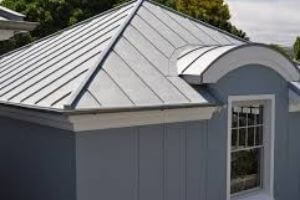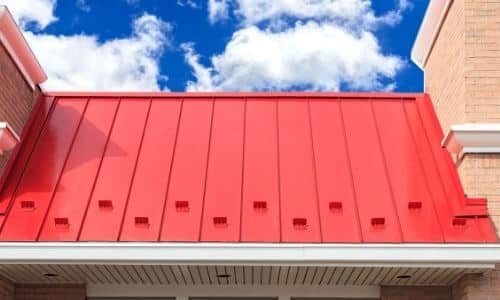Are you looking to buy a new metal roof? Whether you’re a roofing contractor, or a home or business owner, you should know what kind of metal roofing will suit your needs. It isn’t unusual to find people asking, “What materials do you need for metal roofing?”
There isn’t a single roof installation material that can fit the needs of every customer. You must be aware of the pros and cons of the roofing material you choose for your home or business. Your contractor should give you the information you need before making a choice.
Do you know what materials do you need for metal roofing?
This article will discuss the metal roof material list that we’ve mentioned above. Also, we will discuss each material’s pros and cons so you can make the right choice.
There are five common metal roofing materials. These include:

#1. Aluminium Roofing
Aluminum is one of the most popular and abundant metals, globally. Major industries use it for different application. A good example is the canned beverage industry and its use in metal roof installation. You can use it for a metal roofing project in environments where there is salt or seawater.
An aluminum roof can withstand harsh weather. Another quality that sets aluminum roofing apart from other metals is that it is sustainable. It is suitable for different structures. Here are some of the pros and cons of aluminum as a roofing material.

PROS
– It is Recyclable
Most of the metal roofing used is recyclable. 95% of aluminum used for roofing comes from recycled material from aluminum products. There is a need to use sustainable products in the construction industry. This is why aluminum is so popular.
– It is Lightweight and Strong
Aluminum roofing products are easy to manipulate and install since they are lightweight. Even though it is lightweight and thin, it is durable and as strong as other thick metals.
– It Does Not Rust or Corrode
Aluminum is an excellent material for coastal areas. It does not contain red rust, and corrosion is minimal.
– It is Readily Available
As we mentioned earlier, aluminum is very popular worldwide. This makes it an excellent material for use in structural applications.
CONS
– It Doesn’t Hold It’s Natural Color
Your contractor will not need to use aluminum roofing in its natural silver/gray color. Once it starts aging, it will go through weathering and get spotty. To overcome this, you will have to use resin-coated roofing panels that will age better.
– It Can Easily Dent
Aluminum roof panels are lightweight and thinner than those made from other metals. They can, dent with minimal effort.
– Increased Thermal Movement
Aluminum can contract and expand twice as much as a steel roof. It is best to follow simple aluminum metal roof installation instructions. For instance, you should ensure not to double pin panels that are longer than 20′.
Related Article: Best Tool Belt for Roofing 2020!
#2. Galvalume
Galvalume roofing is a mixture of zinc, aluminum, and steel. While making Galvalume roofing material, manufacturers use a steel sheet as the base. The sheet is then hot-dipped with zinc and aluminum alloys. Once the coating reaches a consistency of 1.6% silicone, 43.4%zinc, and 55% aluminum, it is ready. This way, the roofing system has all the strengths of each metal combined.

PROS
– There Are Many Color Options
One of the reasons why Galvalume is so appealing to homeowners is that it comes in various colors. This allows buyers to match the entire roof to their business or home scheme color.
– It is Affordable
Galvalume material is more affordable compared to other metal roofing materials. The pricing will depend on the quality and the color of the Galvalume metal roofing panel you choose.
– Resistant To Corrosion
The process of coating the steel sheet with zinc, aluminum, and silicone ensures that Galvalume is as tough and strong as zinc. But, still has aluminum’s corrosion-resistant property.
– Easy to Manipulate
Galvalume is an excellent material to use for panel forming to fit any project. It is also recyclable.
– You Can Install It On An Existing Roof
This is one of the most significant benefits of using Galvalume roofing. An excellent contractor has to learn how to re-roof or retrofit over an existing roof. Doing this will ensure that there aren’t any associated costs with tearing off the old roof.
CONS
– Oil Canning
Oil canning is an aesthetic concern with most cold-formed and lightweight metal products. But, it does not affect the performance or strength of a Galvalume roof deck. Your contractor can use different underlayment methods to Galvalume roofing. This ensures that there’s enough space between the metal panels. This reduces oil canning.
– Fading
Galvalume metal panel can come in many different colors. Over time, the color will fade due to the effects of UV and sun exposure.
– It Doesn’t Perform Well With Other Materials
On its own, Galvalume combines the positive attributes of both aluminum and zinc. But, contact with other materials may cause it to corrode fast. It may also lead to the Galvalume roof panels not working as they should.
#3. Copper Metal Roofing
Copper roofing has been in use for many years. There’s evidence that the Romans used it to install the roof over the Pantheon. There are many residential and business properties that still have a copper roof.

PROS
– It’s Lightweight
Copper roofing is more lightweight as compared to other forms of roofing, such as a shingle roof. This attribute ensures that there isn’t any pressure on the structure of the building. Additionally, it makes the material easy for contractors to work with.
– It Promotes Energy Efficiency
Copper roofing allows for energy savings
– Durable
A contractor can follow the step by step metal roof installation required of copper roofing. This ensures that the roofing lacks decades. Copper can withstand weather conditions like strong winds, frequent rainfall, and heavy snow.
– It is Aesthetically Pleasing
When a copper roof is new, it will give off a reddish-brown hue. But, once it starts aging, the effects of sun exposure and oxidation become visible. The roofing adds on a blue-green coating known as patina.
– You Can Solder It
Unlike other roofing materials, it is possible to solder copper.
CONS
– It is A Costly Material
Since copper is not as abundant as other metals such as aluminum, it is expensive. It can cost up to 15 times more than the cost of an asphalt roof. But, if your contractor knows how to install metal roofing using copper, it will last decades.
– It is Vulnerable to Contraction and Expansion
Copper can expand and contract fast. When installing a metal roof, you have to ensure the system can carry the thermal exchange burden.
– Run-off Staining
After rains, a copper roof can stain concrete, brick, metal, and other materials. If you are looking to install a copper roof, you have to be aware of this aspect. Roof installation should allow for water to run-off without contact to other materials.
#4. Zinc Roofing
Zinc is an excellent choice for metal roofing installation that will last you ages. It is a sustainable material that can withstand corrosion.

PROS
– It is Durable
Zinc roofing can last decades.
– Eco friendly
Zinc is eco friendly. It is a natural metal that’s extracted from the earth. You don’t have to worry about any toxicity or ground pollution from your zinc roof.
– Energy Saving
As with most metal roofing, zinc will help you to cut down on energy costs. Using zinc metal roofing will allow you to cut down on the amount of energy absorbed into the building.
– Easy to Maintain
Most people do not have to schedule routine maintenance on a zinc roof because it can self-heal.
– Easy to Form
Zinc is a soft metal. This property makes it easy to shape to fit different uses.
CONS
– It is Costly
One of the most significant disadvantages of zinc roofing is that it comes at a high price. But, the price point comes with assured decades-long durability.
– Oil Canning
As with different other metal roofing, zinc roofing is also prone to oil canning.
– Corrosion on The Underside
Improper coating of the underside of a zinc panel can lead to corrosion. If water gets trapped between the panels, the metal can get weak.
#5. Stainless Steel
Stainless steel is a steel alloy that’s very popular as a roofing solution. Stainless steel is a strong roofing material. It is an excellent choice for business and homeowners.

PROS
– It is Durable
Some of the most powerful applications and products use stainless steel. The reason for this is that it can withstand degradation and corrosion for decades. It is one of the best choices for roofing material.
– It Can Withstand Extreme Weather
Stainless steel can withstand extreme temperature and weather climates. This because it has a low thermal expansion. Also, several stainless steel roofing materials are used in coastal climates.
– Doesn’t Give in To Temperature Fluctuations
Stainless steel is a great choice for areas with extreme climate conditions. It doesn’t contract or expand due to temperature differences.
– Warranty
Most companies will give you a warranty on stainless steel roofing solutions. This is because it is a durable material.
– There Are Many Finish Options
Stainless steel comes in different finishes such as polished grey or dull material. This ensures that you can match building materials with the finish on your roofing.
CONS
– It is Costly
Stainless steel has the same price range as copper and zinc. This makes it an expensive, roofing material.
– Standing Water
Stainless steel roofing needs to have well-installed drainage solutions. This ensures it can maintain it’s functionality and durability. If there’s too much-standing water, stainless steel is subject to corrosion.
Conclusion
Aluminum, zinc, Galvalume steel, and other metals are excellent choices for metal roofing materials. You have to understand the properties of a structure or building. This will help you choose the best roofing material for you and your needs.

Some of the factors you should consider before you buy a metal roofing solution include:
a) The strength of the material in relation to how well it can take different climates
b) How much weight your building structure can hold
c) Whether the metal roofing is energy efficient
d) Maintenance needs of your roofing material
e) Whether it’s recyclable
f) The cost of your roofing solution
By now, you have an answer to your question, “what materials do you need for metal roofing?” Remember, before you buy any metal roofing, consider it’s advantages and disadvantages. We have listed some of them above. You will also have to look into the local availability of the material of your choice.

